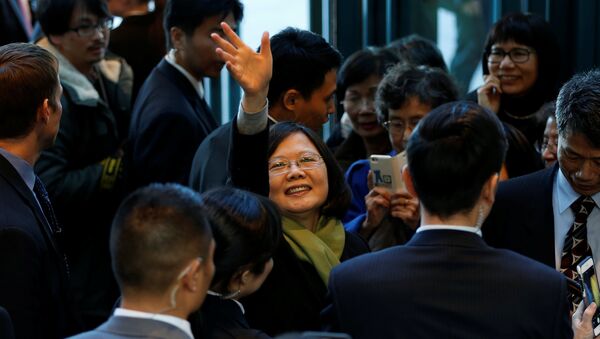The potential adoption of two bills aimed at bolstering US-Taiwanese relations will mark a fundamental shift in Washington's foreign policy and may provoke a new crisis in the Taiwan Strait, Chen Xiaoxiao, a researcher at Xiamen University, told Sputnik China.
"This will not only seriously undermine the sovereignty of the People's Republic of China (PRC), but will also affect the very essence of the relationship between the PRC and the US," Chen emphasized. "I hope that Trump will be extremely cautious about this matter."
On Tuesday the US House Foreign Affairs Committee passed the Taiwan Travel Act which envisages high-level official visits between Washington and Taipei as well as the bill that aims at helping Taiwan regain its observer status at the World Health Organization (WHO).
The US severed diplomatic relations with Taipei in 1979, and since that time has officially adhered to the One-China policy, which says that both Taiwan and mainland China are parts of the PRC.
The issue goes deep into history when Taiwan, also known as the Republic of China (ROC), lost control of mainland China in 1949 after its defeat in the Chinese Civil War between the Kuomintang (KMT)-led government and the Communist Party of China (CPC).
"I believe that unless Taiwan recognizes the one China principle, the so-called issue of its 'external space', as well as Taiwan's desire to join international organizations will be more difficult to realize. This is a fundamental moment," the Chinese researcher pointed out.
Chen pointed out that Beijing's policy towards Taipei is "consistent and clear." "If necessary, the policy combines both stiffness and softness," she stressed.
The researcher explained that Beijing proceeds from the premise that nothing unplanned and extraordinary should happen in the Taiwan Strait.
"Thus Beijing maintains control over the Taiwan issue," the researcher noted. "As for the Taiwanese side, it is important for Taiwan to actively seek a dialogue with Beijing, and not to provoke [Mainland China] by testing its patience and checking where the red line passes."

'Trump May Use Taiwanese Card to Obtain Concessions From Beijing'
According to Andrei Karneev, deputy director of the Institute for Asian and African Affairs at Moscow State University, the Taiwan issue has again been brought into the spotlight by Washington as it was in the first weeks after the election of Donald Trump.
While the recent decisions were made by the traditionally pro-Taiwan Congress, it is up to the US president whether or not to sign them into law, according to Karneev. The Russian academic suggested that Trump may use the Taiwanese card to gain certain concessions from China, in particular on the North Korean nuclear program.
Meanwhile clouds are gathering on the Chinese horizon on "the trade front," he noted: Washington has taken a number of measures aimed at restricting the access of Chinese goods and investments to the US market.
At the same time, judging from some statement by US law-makers, it is likely that Congress will continue to push ahead with increasing arms supplies to Taipei. "We can talk about such sophisticated systems as the stealth multifunctional fifth generation fighter-bomber F-35," Karneev presumed, adding that weapons supplies would exert more pressure on Beijing than US economic measures.
For its part, Beijing has raised the alarm over the US' Taiwanese bills. Foreign Ministry spokesman Lu Kang told a press briefing Thursday that the pieces of legislation passed by the US House Foreign Affairs Committee amount to a serious violation of the One-China policy.
While it is difficult to say whether new US bills will be signed into law, it is clear that the Chinese leadership will perceive the change of the status quo as Washington's attempt to undermine Sino-US ties, peace and stability in the Taiwan Strait, Karneev concluded.
The views and opinions expressed by Chen Xiaoxiao, Andrei Karneev are those of the contributors and do not necessarily reflect those of Sputnik.





